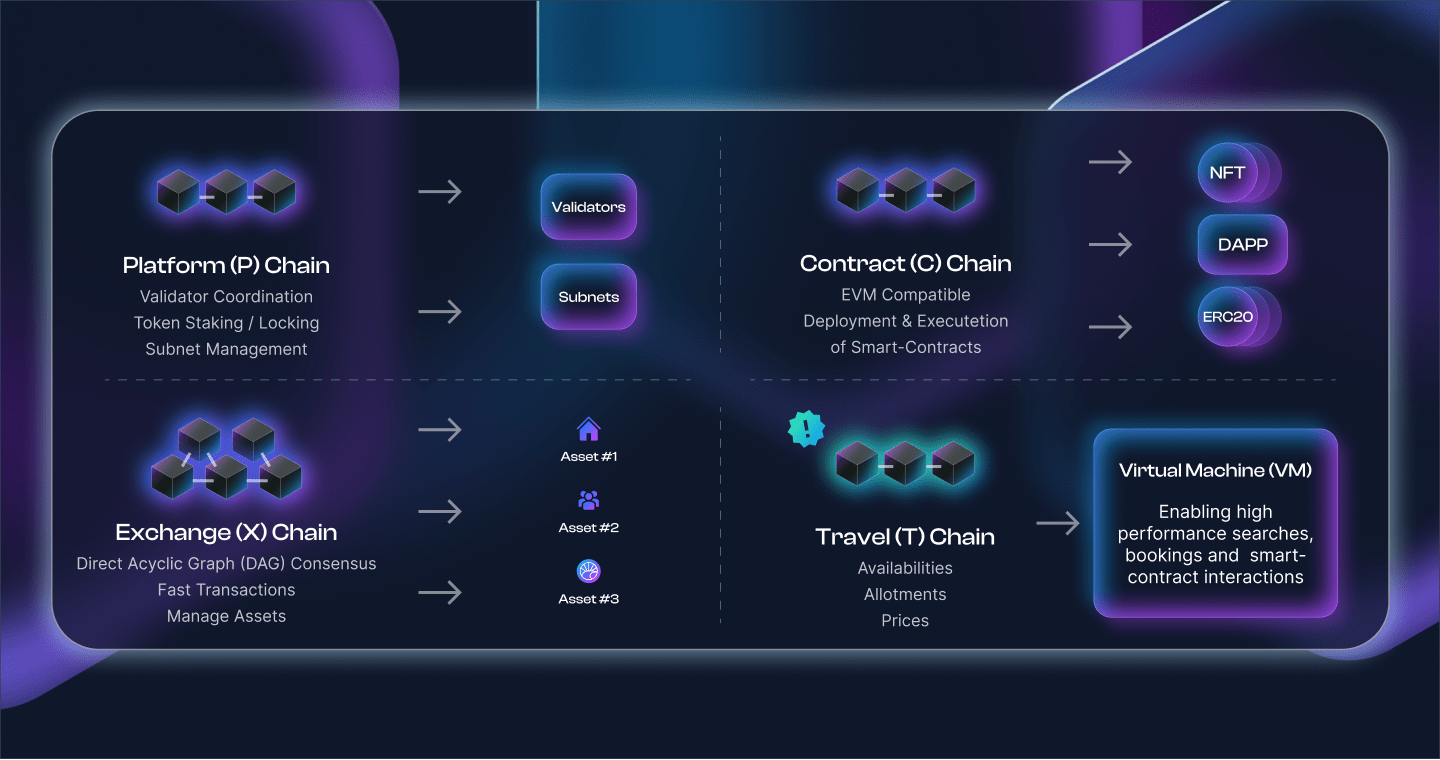We are going to get a bit more technical again and explain why the travel industry needs its own so-called Layer 1 blockchain.
Let's take a step back in case you're new here, or we still couldn't convince you why it's time for travel to go web3.

Many industries and companies are, especially in the last few years, getting more and more hooked on working with blockchain technology. But why is that actually the case? We, at Chain4Travel, have found three essential benefits blockchain can offer for industries out there (including the travel industry, of course).
The first point, and the one that probably most strategists, share- and stakeholders among you are interested in: Blockchain is a powerful tool for further digital transformation and, thus, can lead to significant cost reductions and efficiency gains. Just think of the automation possibilities through smart contracts. In the travel industry, companies can benefit from blockchain capabilities through the Camino blockchain. A global shared infrastructure, allowing future access to a unified booking, payment, and settlement process across travel categories, can potentially reduce costs for every travel company that participates.
Secondly, (Cyber)security - a topic that is becoming increasingly important but at the same time extremely difficult to implement for many companies - can be better ensured by blockchain technology. By nature, for example, through its features like a decentralized, immutable ledger, it is much more secure than the systems currently used by the travel industry. Sensitive customer and financial data are handled on a daily basis in the industry, so the risk of hacker attacks and/or cyberattacks is high. While central corporate systems are often more vulnerable to such attacks, decentralized systems are much more difficult to compromise. Bitcoin, for example, was able to ensure a near 100% uptime (meaning that it was up, running, and functional) since its inception.
Thirdly, have you ever lost a piece of luggage? Then you know that baggage information is not passed on very efficiently between companies... Was it the fault of the airport, the airline, or did you have a connecting flight, and even more companies came into play who promised you that "they definitely didn't lose your luggage"?
This is just one example where blockchain technology can help as it supports data sharing, tracking of transactions and can provide data transparency to all participating companies as needed and defined. Thus, a decentralized platform built on a blockchain can provide greater accountability for the whole travel industry and improve the customer experience, as all transactions are recorded on the blockchain and can be easily audited. Also, information can be shared across companies and borders easily, which is vital to serving global travelers well.
You see, blockchain offers many advantages, and we are looking forward to discussing them with you more in-depth.
So, why does the travel industry need a Layer 1 blockchain?
First of all, the travel industry is one of the largest in the world, with 6.1% of global GDP in 2021 (that was during Covid! Before the global pandemic, it was even 10%). We believe that this size is enough to build a unique global shared infrastructure - customized exactly as the travel industry needs and wants it. An infrastructure that is jointly governed by travel companies with equal voting power. A blockchain as unique as the industry itself and a “safe space” in the web3 environment.
Good to know: What is a Layer 1 blockchain explained in 1 sentence
A Layer 1 is a base blockchain protocol that is designed to be a standalone, self-sufficient system that can process transactions and maintain its own consensus without relying on external networks or systems. The most prominent examples of Layer 1 blockchains are Ethereum and Bitcoin.
Having its own global shared infrastructure allows the travel industry to develop its own decentralized ecosystem the way it wants. This is exactly what we want to facilitate with Camino Network: With over 120 companies already participating as supporters and validators and our team having decades of experience in the travel sector, we know the industry - and are able to connect companies, form partnerships, and work together in a completely new, collaborative ecosystem. A customized travel industry blockchain also means that travel players do not have to rely on public blockchains, where other stakeholders and interest groups enforce their needs, such as Finance (Defi) or Gaming (Gamefi). Also, the strong community of travel companies promises a thriving ecosystem where new business partners and customers can be found.
Before we share some of the benefits of Camino as a customized travel blockchain with you, let's get one thing straight: we haven't reinvented the wheel. Our mission is to take the best of existing blockchains and tailor the blockchain to the travel industry — all EVM compatible. As a result, all the mechanisms have already been thoroughly tested by other ecosystems. At the same time, we are working on several exciting customizations in four areas.
So let's look at some of the thrilling features that will be customized for you!
Firstly, the so-called T-Chain (T for travel) will be part of the Camino ecosystem. The T-Chain in the Camino blockchain is unique to the blockchain space and will be built to process travel transactions in a standardized way, even across travel categories. The T-Chain provides certified, time-stamped prices and availabilities across travel categories for direct customer engagement and secure bookings. The T-Chain will significantly improve travel distribution and let travel companies go into creative mode instead of focusing on technical access to more travel content.

The second area concerns the governance in the Camino Network. Currently, the travel industry is led by a few industry giants that set the tone. Smaller and medium-sized companies are at a disadvantage. In Camino this will be different. Every company that becomes a validator of Camino also has one voting right independent of its stake and can thus actively participate in the direction in which the industry's own ecosystem is developing. In addition, each validator is required to stake the same amount of Camino tokens. Thus, the stake itself does not equal power on the network.
Thirdly, we introduce KYC/KYB verification for validators and builders that deploy a smart contract on Camino. Camino is a public & permissioned blockchain. Everyone is allowed to participate, and we're welcoming everyone who likes to participate. However, by having validators and dApp developers (dApps are applications built on the blockchain, think AppStore but in the web3 world) perform a KYC/KYB process, we can ensure an increased security level.
In addition, our KYC/ KYB verification also allows us to realize the efficiency gains: We can use a particularly fast mechanism (consensus algorithm) called Proof-of-Stake & -Authority driven consensus (PoSA) enabled by the aforementioned validator verification. This allows the network to perform billions of transactions in the travel industry.
Another advantage of the consensus algorithm: Camino is particularly environmentally friendly! Proof-of-stake consensus-driven blockchains can reduce energy consumption by 99,9% compared to Proof-of-Work consensus-driven chains.
Finally, a crucial customization is the control of the transaction fees. Normally, there are algorithms that calculate the currently justified transaction price - network traffic, supply, and demand are classic aspects that play a role in this. However, in order for the travel industry to remain competitive at all times and to allow for microtransactions, e.g., for ancillaries, customization is needed. Thus, validators are able to vote on adjustments to the transaction fees. This ensures reasonable transaction fees, especially when the Camino token fluctuates. In that way, participating travel companies will be able to cover the cost of running the node and - at the same time - benefit from a reliable, secure infrastructure to build all kinds of applications on.
You see, we are customizing Camino in important aspects. At the same time, the blockchain technology we are building is based on a public chain - called Avalanche - with a vibrant community with many brilliant minds. We benefit from constant development in the community and incorporate major Avalanche improvements (e.g., security elements) in Camino. Similarly, we contribute to the community with our developments that are all open-source. An alternative would be enterprise blockchains, however, we would not want to rely on blockchains provided by a central entity. Blockchain is a "we" technology, not a "me" technology.
As you can see, we have a lot planned. And we look forward to welcoming you to the Camino community. The Camino blockchain will live from the global network of travel companies, the collective intelligence, and the many ideas for use cases and dApps of each travel company. Because most companies know already: We need to actively shape the progress to benefit from it. If you or your company want to be at the forefront of this industry movement as well and have suggestions or questions, please feel free to contact us at hello@chain4travel.com.